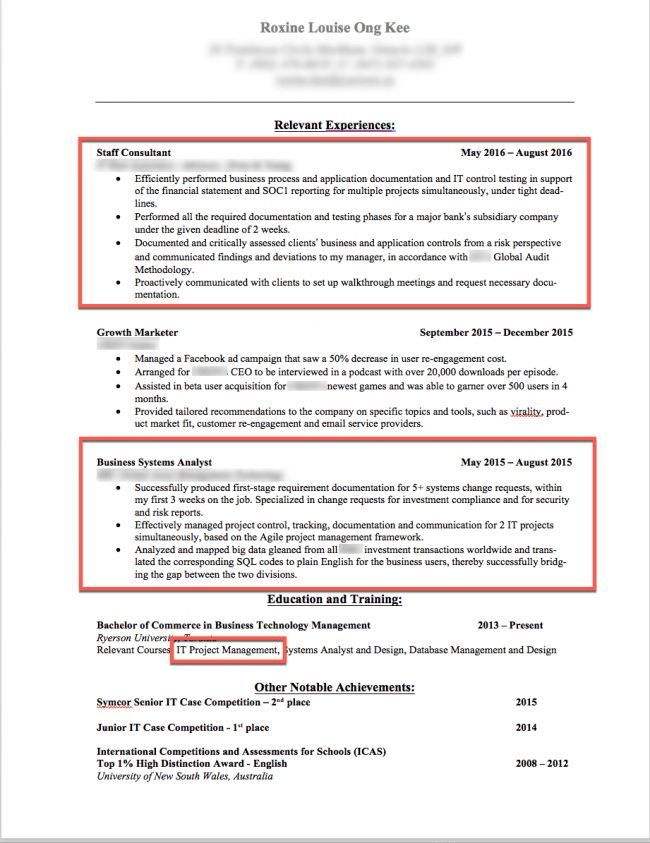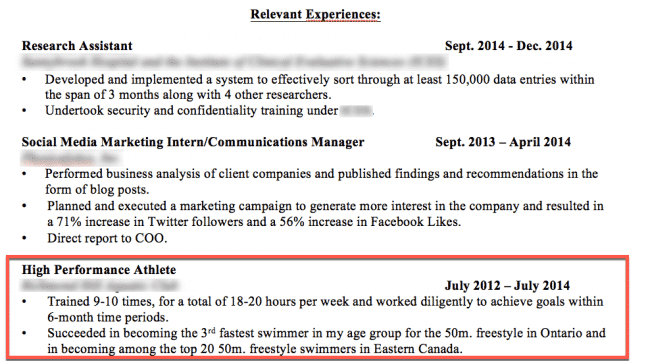6 seconds.
According to a study done by TheLadders, that’s how much time a recruiter or hiring manager is going to give your resume.
I know, I know. That’s sad and discouraging to hear, especially if you’ve just spent hours and hours painstakingly crafting every word and tweaking margins and font sizes to achieve god-like resume status.
(At least you’re not a professional speed stacker, whose career depends on how quickly you can build a cup-pyramid and tear it down in much less than 6 seconds. But that’s beside the point.)
In reality, most resumes are never even seen by a human recruiter. And the majority of those that do make it to a recruiter’s desk are often thrown away seconds later.
It’s nothing personal (even though it kind of is) – this is just a consequence of the numbers. Take Google, for example. Its recruiters get about 3 million resumes a year – which breaks down to over 8,000 a day.
Now that’s a lot of competition. But it’s not all bad news, because there are a lot of prevalent mistakes that people make on their resumes.
And if you can learn to avoid these, you’ll get a huge leg up on the competition.
So today, we’re going to go over 7 of the worst mistakes you can make when crafting your resume… and how you can avoid them.
Mistake #1: Listing What You Did, Rather Than What You Accomplished
Employers care less about what you were expected to do than about what you actually accomplished. At the same time, though, you need to be as specific as you can be with the limited space you have.
Here’s how you marry those two constraints together:
1. Quantify your accomplishments
For example, here’s an excerpt from my current resume:

As you can see in my second bullet point, though the 20k wasn’t even about the company I worked for, putting that number in there tells a recruiter that, Hey, I’ve done real marketing and PR – I might be able to do something similar for you, too!
2. Include keywords and industry lingo that recruiters are looking for
Many companies use both human recruiters and applicant tracking systems to scan resumes for specific keywords and sort through them that way. So if you have the right words that the recruiters and the computers are looking for, then your application can breeze through the initial scan.
Mistake#2: Typos
If you’ve ever written an essay (which I’m assuming you have!), you know how frustrating editing for typos can be. On screen, the grammar and spelling look perfect… until you print it out and see that you sepelld twevle wodrs wrnog, icndulnig yuor own nmae.
Moral of the story: Don’t settle for looking things over on the screen.
Instead, print out your resume, get a red pen and mark it up. If you can find a quiet study area where you can read each line out loud, even better. You may feel silly while doing it, but trust me — it’ll be worth it once you land that interview (and maybe a job offer!).
Oh and, if you can, get a career counselor to review your resume. If you’ve never visited your career counselor before, I’d encourage you to do it! Chances are, your career counselor has spoken to hundreds of students and employers; they know what works and what doesn’t.
Mistake #3: Including Irrelevant Work Experience
There should be a reason why every single position or job is on your resume. Each part has to showcase a specific skill or quality that the job application calls for.
For example, when I applied for a position as a project coordinator, I made sure that the achievements highlighted in my resume focused on how I got tasks done on time and with quality, even if the job itself wasn’t related to project management at first glance.

Even if the specific position may not be as relevant, try to make your accomplishments specific to the job you’re applying for.
For example, I had worked as a research assistant for a hospital in Toronto for my first paid gig (you can check out that resume in the next section). When I was applying for jobs after that experience, I would word my accomplishments differently depending on the position:
- If the job were at a health-related company, I would focus on the details and the impact of the research I had worked on.
- If the position were for a business role at a bank, I would talk about big data in healthcare (industry lingo!) and about the system I had helped put in place to sort through all of the data.
Mistake #4: Excluding Unpaid Work Experience
Similar to Mistake #3, a lot of people leave out relevant experiences from their resume just because they didn’t get paid for them.
Don’t!
If they’re the most relevant thing you’ve done, don’t hide volunteering and student leadership experience away in a “volunteering and clubs” section.
Put them right in the experience section. Recruiters don’t care about whether or not an experience paid – they just want to know if you can do the job or not.
As Brad Karsh, a former recruiting director and author, put it in his book Confessions of a Recruiting Director:
“Most students think that if they didn’t get paid to do something, it can’t go in the Experience section. That’s a big mistake. Employers look at it totally differently. Their perspective is, if it was a meaningful experience that provided meaningful skills necessary for the job, then it’s worth putting in the experience section, even if it was an extracurricular or volunteer position.”
For example, in the experience section of my resume when I was applying for my first paid internship (aka co-op for us Canadians), I put in the fact that I had been a competitive swimmer in my past life:

As you can see, I didn’t just show how confident (or full of myself) I was – I also highlighted how much I trained while attending university.
Why? Primarily I did this to stand out and make myself a more exciting candidate, so I would pass the initial 6-second read-through. Furthermore, this detail showed I had proper time management and organizational skills.
And the gamble paid off. For this specific resume, despite the fact that it had just one paid, part-time work experience, I landed three interviews and two job offers for that summer. One of these jobs was a role in the largest bank in Canada, which became my first paid full-time job 💸
Mistake #5: Following All the Rules
At some point in your college career, you’ll probably have to take a class that teaches you how to write a resume (if you haven’t already).
They’ll likely give you all kinds of trite little details you’re supposed to remember and follow to the letter:
- It must be size 11 font!
- It must be Times New Roman!
- You must list your education as “Bachelor of Science, [major], [year]”!
- Put your middle initial in your name; it’s more professional!
And if you follow all these rules, you’re bound for success – right?
Sigh…
Now, repeat after me:
“This is my rifle resume. There are many like it but this one is mine…”
Ordinary is boring! It’s boring to you, and it’s boring to hiring managers.
People who do hiring go through stacks upon stacks of boring, normal-looking resumes. Don’t be afraid to make a resume that stands out.
Mistake #6: Not Including Your Personal Website
Resumes are old hat. They’re boring, they’re typical, and they’re stagnant. Once you hand your resume to someone, you can’t change it. If you go into work tomorrow and do something awesome, the resume your handed out yesterday won’t reflect it.
That’s why you need a personal website.
A personal website can be updated. It can look like whatever you want – you have almost unlimited creative freedom with it. Not to mention the fact that taking the time to learn how to build a website is an impressive feat in itself. (Especially since most people still think you need to be a programmer to make one).
If you don’t have a personal website yet, get one. Check out Thomas’s complete website building guide to create your own from scratch.
Now, assuming you have a personal website, you really need to have the URL listed at the top of your resume. Here’s how:

By doing this, you give the person holding your resume a way to stay updated and view the most current professional picture of you. All they have to do is visit that URL at the top of your resume.
Don’t forget to include it!
Mistake #7: Using the Exact Same Resume for Different Jobs
If you really want the job, your resume has to scream, “I’m the one,” from the get-go.
This is why it’s important to customize your resume and cover letter to each application and employer – because this is how you stand out and look different from everyone else to an employer. The problem here, then, is that you’re probably sending out quite a bit of applications, and customizing each one takes time.
Here’s a tip you can use to balance blasting applications to a bunch of employers efficiently, while still tailoring your application to each position: Use a master resume that has all your jobs, accomplishments and volunteer experience on it.
For your master resume, don’t think about formatting or keeping your experiences and qualifications to 1 page – just have everything in there.
Then, when a specific job catches your eye, you can just cut and edit the wording of your experiences for that particular role. This way, you don’t take hours to apply to each posting, nor do you send out a generic application. 🙌
One Final Thing
Finally, here’s something most students forget: Employers know that you’re a student. Because of this, they don’t expect you to be a master in data analytics, ad retargeting, or JavaScript programming.
For the most part, hiring managers for student roles are looking for people who:
- Are teachable and eager to learn new skills
- Are fun to work with
- Have a killer work ethic
- Ask good questions
Why? Because they know that it doesn’t matter how much innate ability a candidate has, as long as they’re committed to constant growth.
Good employers bet on potential. They know that as long as someone is committed to getting better and working hard, that candidate will eventually catch up to and surpass someone who has more skill but lacks drive.
In short, most smart, high-quality employers would prefer to hire humble hustlers than arrogant geniuses.
With this mind, aim to showcase the soft skills listed above just as much as your hard/technical skills in your resume and your cover letter when applying for jobs.
Take a look at your resume right now – which of the mistakes have you committed?

